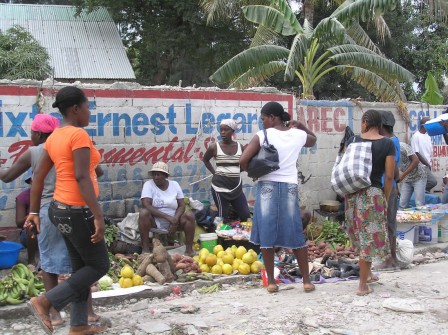
From Rock Stars to the Red Cross the whole world seems to be collecting money and supplies to send to post earthquake Haiti. That's a good thing, but in the " teach a man to fish as opposed to giving him a fish" department, here's an even better thing.
Here's the deal. Haitian workers sew many of the garments sold in the United States. Those lucky enough to work at these sewing jobs work long hours for around $3.09 a day. Unemployment runs at about 80% in Haiti these days.
Recently, the Haitian legislature passed an act requiring that Haitian garment workers be paid $5.00 a day. What could be easier. More and more American manufacturers are sending garments to Haiti to be assembled. Names like Hanes and New Balance contribute to the $513 million worth of Haitian made apparel coming into the United States as the result of HOPEII, an act passed by Congress in 2008 which lets Haiti export textiles to the USA duty free for the next decade.
What could be easier than making sure that all Haitian workers in factories participating in HOPEII get $5.00 a day. Surely, companies like Hanes and New Balance can afford it and if not, I'd be willing to pay an extra dollar for socks and sneakers. Wouldn't you?
One of my favorite blogs, News Junkie Post ,recently addressed the issue of corporate responsibility in Haiti and offered this analysis
"Living in Haiti is not cheap and that is why the $3 a day figure it’s horrific. In Port-au-Prince a gallon of gasoline is $5 a gallon on a good day, $30 in a real bad one. The cost of a soda in Haiti is almost equal to the cost of a soda in the US. By earning $3.09 a day, people in Haiti can’t even give themselves the luxury of drinking a Pepsi, much less ever afford to buy a bicycle."
$5.00 a day isn't too much to ask and the difference it would make for Haiti's economy is incalculable. It's really very simple. Let's help Haiti not just for a day but for a lifetime by working to make sure Haitian garment workers get what's coming to them and boycotting American manufacturers who continue to exploit them.
source: Truthout
photo credit: Dolores Bernal News Junkie Post


